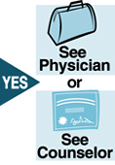DepressionDepression is more than just the blues or the blahs. It makes a person less able to manage life. It affects a persons mood, mind, body, and behaviors. Depression can be as much an illness as diabetes, etc. Causes
|
 |
Symptoms
|
|
Ongoing feelings of sadness, helplessness, hopelessness, guilt, or worthlessness. Crying. |
|
|
Loss of interest in activities that used to bring pleasure, including sex |
|
|
Fatigue. Loss of energy or enthusiasm. |
|
|
Difficulty concentrating or making decisions |
|
|
Anger, anxiety, or irritability |
|
|
Physical symptoms, such as headaches or digestive problems that don’t respond to treatment and don’t let up |
|
|
Changes in eating and sleeping patterns |
Whatever the cause, depression can be treated. Treatment includes medication, psychotherapy, and other therapies specific to the cause of the depression, such as exposure to bright light (similar to sunlight) for depression that results from SAD.
Questions to Ask
Have you just attempted suicide, are you making plans for suicide or do you have repeated thoughts of suicide or death? |
 |
|
|
|
Have you noticed a loss of interest or pleasure in almost all activities most of the day, nearly every day for at least two weeks? |
 |
|
|
|
|
 |
|
|
|
Has depression interfered with daily activities for more than two weeks? Have you withdrawn from normal activities during this time? |
 |
|
|
|
|
 |
|
|
|
|
 |
|
|
|
Does the depression come with dark, cloudy weather or winter months and does lift when spring comes? |
 |
|
|
|
During holiday times, do you withdraw from family and friends or dwell on past holidays to the point that it interferes with your present life? |
 |
|
|
|
|
|
Self-Help
|
|
Take medications as prescribed. Get your doctor’s advice before you take over-the-counter herbs, such as St. John’s Wort, especially if you take other medications. |
|
|
Don’t use illegal drugs. Limit alcohol. These can cause or worsen depression. Drugs and alcohol can also make medicines for depression less effective. Harmful side effects can happen when alcohol and/or drugs are mixed with medicine. |
|
|
Eat healthy foods. Eat at regular times. |
|
|
Exercise regularly. |
|
|
Try not to isolate yourself. Be with people you trust and feel safe with, even though you feel down. |
|
|
Do something you enjoy. |
|
|
Relax. Listen to upbeat music. Read a good book. Take a warm bath or shower. Do relaxation exercises. |
|
|
Talk to a friend, relative, co-worker or anyone who will let you express the tensions and frustrations you are feeling. |
|
|
Keep an emergency number handy (e.g., crisis hotline, trusted friend’s number, etc.) in case you feel desperate. |
|
|
If suicidal thoughts are present, remove any weapons, pills, etc. that could be used for suicide and get medical help. |
What You Can Do for a Friend or Relative
|
 |
